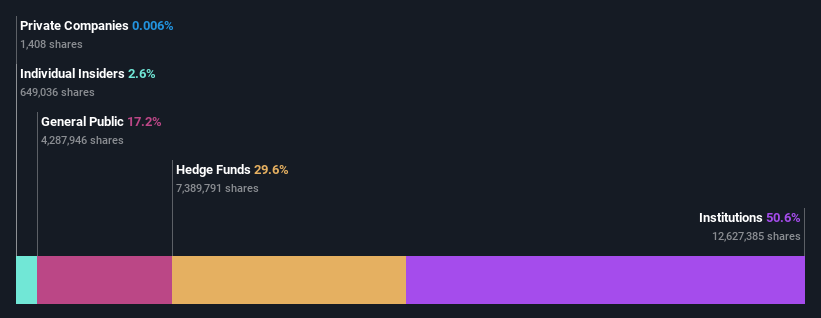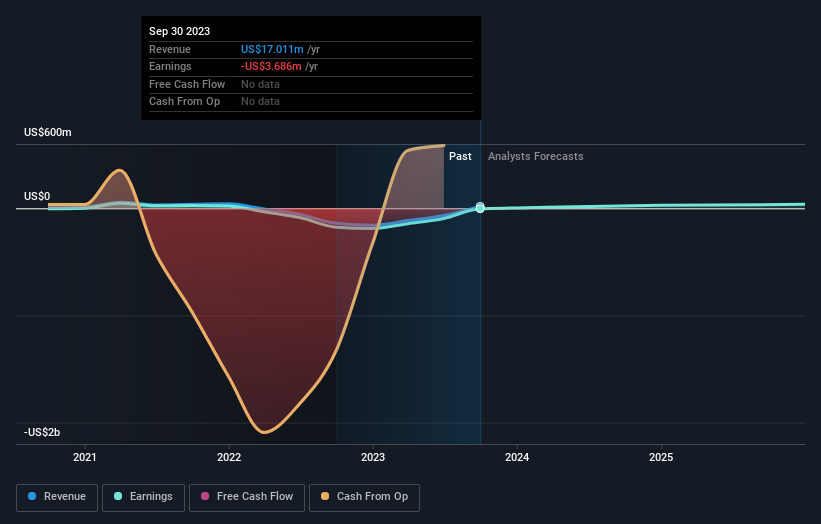- United States
- /
- Mortgage REITs
- /
- NYSE:AOMR
Institutional investors are Angel Oak Mortgage REIT, Inc.'s (NYSE:AOMR) biggest bettors and were rewarded after last week's US$27m market cap gain

Key Insights
- Significantly high institutional ownership implies Angel Oak Mortgage REIT's stock price is sensitive to their trading actions
- The top 2 shareholders own 50% of the company
- Using data from company's past performance alongside ownership research, one can better assess the future performance of a company
Every investor in Angel Oak Mortgage REIT, Inc. (NYSE:AOMR) should be aware of the most powerful shareholder groups. And the group that holds the biggest piece of the pie are institutions with 51% ownership. That is, the group stands to benefit the most if the stock rises (or lose the most if there is a downturn).
And things are looking up for institutional investors after the company gained US$27m in market cap last week. One-year return to shareholders is currently 17% and last week’s gain was the icing on the cake.
In the chart below, we zoom in on the different ownership groups of Angel Oak Mortgage REIT.
Check out our latest analysis for Angel Oak Mortgage REIT

What Does The Institutional Ownership Tell Us About Angel Oak Mortgage REIT?
Institutions typically measure themselves against a benchmark when reporting to their own investors, so they often become more enthusiastic about a stock once it's included in a major index. We would expect most companies to have some institutions on the register, especially if they are growing.
As you can see, institutional investors have a fair amount of stake in Angel Oak Mortgage REIT. This can indicate that the company has a certain degree of credibility in the investment community. However, it is best to be wary of relying on the supposed validation that comes with institutional investors. They too, get it wrong sometimes. When multiple institutions own a stock, there's always a risk that they are in a 'crowded trade'. When such a trade goes wrong, multiple parties may compete to sell stock fast. This risk is higher in a company without a history of growth. You can see Angel Oak Mortgage REIT's historic earnings and revenue below, but keep in mind there's always more to the story.

Investors should note that institutions actually own more than half the company, so they can collectively wield significant power. It looks like hedge funds own 30% of Angel Oak Mortgage REIT shares. That's interesting, because hedge funds can be quite active and activist. Many look for medium term catalysts that will drive the share price higher. Looking at our data, we can see that the largest shareholder is Davidson Kempner Capital Management LP with 30% of shares outstanding. For context, the second largest shareholder holds about 21% of the shares outstanding, followed by an ownership of 8.4% by the third-largest shareholder.
To make our study more interesting, we found that the top 2 shareholders have a majority ownership in the company, meaning that they are powerful enough to influence the decisions of the company.
While it makes sense to study institutional ownership data for a company, it also makes sense to study analyst sentiments to know which way the wind is blowing. There is some analyst coverage of the stock, but it could still become more well known, with time.
Insider Ownership Of Angel Oak Mortgage REIT
The definition of company insiders can be subjective and does vary between jurisdictions. Our data reflects individual insiders, capturing board members at the very least. Company management run the business, but the CEO will answer to the board, even if he or she is a member of it.
I generally consider insider ownership to be a good thing. However, on some occasions it makes it more difficult for other shareholders to hold the board accountable for decisions.
Our most recent data indicates that insiders own some shares in Angel Oak Mortgage REIT, Inc.. It has a market capitalization of just US$229m, and insiders have US$6.0m worth of shares, in their own names. Some would say this shows alignment of interests between shareholders and the board. But it might be worth checking if those insiders have been selling.
General Public Ownership
The general public-- including retail investors -- own 17% stake in the company, and hence can't easily be ignored. While this size of ownership may not be enough to sway a policy decision in their favour, they can still make a collective impact on company policies.
Next Steps:
I find it very interesting to look at who exactly owns a company. But to truly gain insight, we need to consider other information, too. For instance, we've identified 1 warning sign for Angel Oak Mortgage REIT that you should be aware of.
If you are like me, you may want to think about whether this company will grow or shrink. Luckily, you can check this free report showing analyst forecasts for its future.
NB: Figures in this article are calculated using data from the last twelve months, which refer to the 12-month period ending on the last date of the month the financial statement is dated. This may not be consistent with full year annual report figures.
New: Manage All Your Stock Portfolios in One Place
We've created the ultimate portfolio companion for stock investors, and it's free.
• Connect an unlimited number of Portfolios and see your total in one currency
• Be alerted to new Warning Signs or Risks via email or mobile
• Track the Fair Value of your stocks
Have feedback on this article? Concerned about the content? Get in touch with us directly. Alternatively, email editorial-team (at) simplywallst.com.
This article by Simply Wall St is general in nature. We provide commentary based on historical data and analyst forecasts only using an unbiased methodology and our articles are not intended to be financial advice. It does not constitute a recommendation to buy or sell any stock, and does not take account of your objectives, or your financial situation. We aim to bring you long-term focused analysis driven by fundamental data. Note that our analysis may not factor in the latest price-sensitive company announcements or qualitative material. Simply Wall St has no position in any stocks mentioned.
About NYSE:AOMR
Angel Oak Mortgage REIT
A real estate finance company, focuses on acquiring and investing in first lien non- qualified mortgage loans and other mortgage-related assets in the United States mortgage market.
Good value slight.
Similar Companies
Market Insights
Community Narratives




